News & Agenda 2016-2017
When did the data of human heredity become an obsession? The great obsession of human genetics ca. 1910 was the inheritance of mental illness and mental disability. Asylum doctors developed tools to investigate the families of their patients, calculated probabilities of mental illness in offspring based on their ancestry, compiled pedigrees of insanity, and adopted filing technologies based on data cards. The new statistics and the new genetics of the early twentieth century grew from data and research methods from these institutions.
Theodore Porter is professor of history at the University of California in Los Angeles (UCLA)
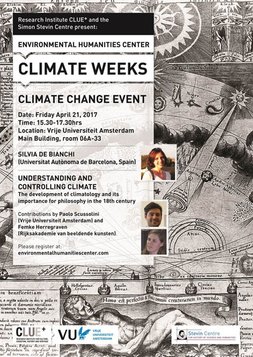
Stevin seminar #23
Together with the VU Environmental Humanities Center
Room: VU HG 06A-33
Date: Friday April 21, 2017
Time: 15:30 – 17:30 hr.
Understanding and Controlling Climate. The development of climatology and its importance for philosophy in the 18th century.
Silvia de Bianchi
To control climate is believed to be a priority in current policies and International agreements, but has it been already the case before? How do we understand "controlling climate" today? And how was it before? In this paper I shall analyse the approach that scientists and philosophers endorsed in the 18th century in discussing climate. I shall clarify in which sense they talked about understanding and controlling it. Furthermore, I shall highlight the relevance of climatology for the philosophy of Immanuel Kant. This in turn will lead us to discuss the way in which we portray the relationship between philosophy and climate science today and to investigate the nature of their interrelation.”
Silvia De Bianchi is Ramón y Cajal fellow at the Department of Philosophy at the Universitat Autònoma de Barcelona.
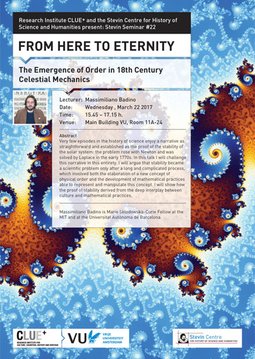
Stevin seminar #22
Date: Wednesday, March 22 2017
Time: 15.45 – 17.15 h.
Venue: Main Building VU, Room 11A-24
From Here to Eternity: the Emergence of Order in 18th Century Celestial Mechanics.
Massimiliano Badino
Very few episodes in the history of science enjoy a narrative as straightforward and established as the proof of the stability of the solar system. According to this narrative the problem rose with Newton and was solved by Laplace in the early 1770s (or, alternatively, in the mid-1780s). In this talk I will challenge this narrative in this entirety. I will show how the proof of stability derived from the deep interplay between culture and mathematical practices..
Massimiliano Badino is Marie Sklodowska-Curie Fellow at the MIT and at the Universitat Autònoma de Barcelona.
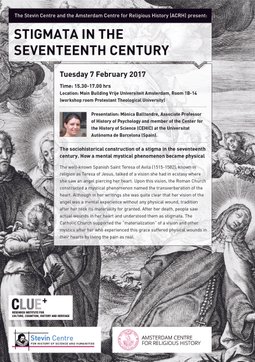
Stevin seminar #21
Together with the Amsterdam Center for Religious History
Room: VU HG-11A22 (38/19T)
Date: Tuesday 17 February-2017
Time: 15:30-17:10 hr.
Stigmata in the seventeenth century. How a mystical phenomenon became physical.
Mònica Balltondre
The well-known Spanish Saint Teresa of Avila (1515-1582) talked of a vision she had in ecstasy where she saw an angel piercing her heart. Upon this vision, the Roman Church constructed a mystical phenomenon named the transverberation of the heart. In the context of the reception of her mystical legacy along the 17th century, medical, scientific and also gender discourses played a role. The involvement of the body as the locus of the mystical experiences changed in 17th century. I will discuss which sociohistorical changes could explain the construction of that mystical phenomenon.
Mònica Balltondre is Associate Professor of History of Psychology at the Universitat Autònoma de Barcelona
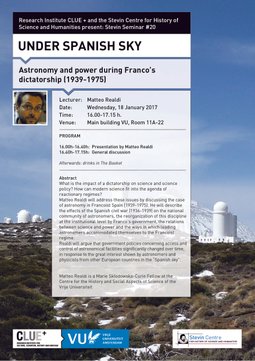
Stevin seminar #20
Room: VU HG-11A22 (38/19T)
Date: Wednesday, 18-01-2017
Time: 16:00-17:15 hr.
Under Spanish sky. Astronomy and power during Franco’s dictatorship (1939-1975)
Matteo Realdi
What is the impact of a dictatorship on science and science policy? How can modern science fit into the agenda of reactionary regimes? In this talk Matteo Realdi will address these issues by discussing the case of astronomy in Franco’s Spain (1939-1975).
Matteo Realdi is a Marie Skłodowska-Curie Fellow at the Centre for the History and Social Aspects of Science of the Vrije Universiteit Amsterdam
Stevin Seminar #19
Kraamkamer van de kunstenaar: Cornelis Anthonisz (c. 1505-1558) tussen kunst en wetenschap
Daantje Meuwissen en Fokko Jan Dijksterhuis
Vrijdag 11 november 2016, 16.00-17.15u
Hoofdgebouw VU, zaal 14A-20
Programma
16.00-16.30u: presentatie Daantje Meuwissen
16.30-16.40: commentaar Fokko Jan Dijksterhuis
16.40-17.15: plenaire discussie
Aansluitend borrel in The Basket
Abstract
De bijdrage van vroegmoderne kunstenaars aan de wetenschappelijke ontdekkingen van deze tijd is een fascinerend onderwerp. De afgelopen jaren is men tot de conclusie gekomen dat kunstenaars niet louter illustratoren waren in dienst van nieuwe ontdekkingen. Kunstenaars, en prentmakers in het bijzonder, droegen juist actief bij aan het verwerven en verspreiden van kennis op het gebied van deze ‘nieuwe wetenschappen’ zoals cartografie, anatomie, botanie en optica.
In deze lezing staat de Amsterdamse kunstenaar Cornelis Anthonisz (c. 1505-1558) centraal, die vooral bekend is vanwege zijn kaart van Amsterdam in vogelvluchtperspectief (1538). Kunsthistorica Daantje Meuwissen ontdekte in 2014 het persoonlijke schetsboekje van deze kunstenaar, dat zich in het Kupferstichkabinett in Berlijn bevindt. Dit minuscule boekje (14 x 10 cm) bevat vele schetsen van portretten, figuren, stadsgezichten, dierenstudies en ornamenten, maar ook perspectiefoefeningen en verkenningen in de meetkunde, optica en mogelijk de cartografie. Meuwissen onderzoekt aan de hand van deze bron hoe Anthonisz zijn artistieke vaardigheden gebruikte om nieuwe kennis te verwerven. Het schetsboek van Cornelis Anthonisz levert een unieke kijk in de ‘kraamkamer’ van kennis van een kunstenaar.
Dr. Daantje Meuwissen is docent kunstgeschiedenis vroegmoderne tijd aan de Vrije Universiteit Amsterdam
Prof. dr. Fokko Jan Dijksterhuis is bijzonder hoogleraar Kennisgeschiedenis vanwege de C. Louise Thijssen-Schoute Stichting aan de Vrije Universiteit Amsterdam
* * *
Stevin Seminar #18
De wetenschappelijke beoefening van het burgerlijk recht in de lange 19e eeuw
Prof. mr. C.J.H. Jansen, Radboud Universiteit
Wanneer: Maandag 3 oktober 2016
Waar: VU, Initium 3B59
Hoe laat: 15.45-17.00u.
In de afgelopen jaren is veel gediscussieerd over de methoden van het burgerlijke recht. Centraal in mijn lezing staat de vraag welke methoden de wetenschappelijke beoefenaren van het burgerlijke recht in de lange 19e eeuw (1780-1920) hebben gebruikt. Het antwoord op deze vraag blijkt nauw verbonden te zijn met iemands visie op de verhouding tussen wet en rechter. De wisselwerking tussen rechtsbronnenleer en wetenschappelijke methoden vormen daarom een belangrijke rode draad in deze lezing.
* * *
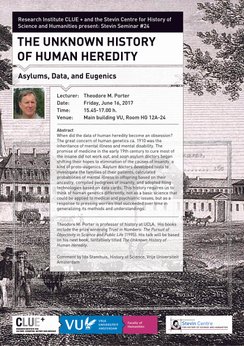
Stevin seminar #24
Room: VU HG 12A-24
Date: Friday 16 June 2017
Time: 15:45-17:00 hr.
The Unknown History of Human Heredity: Asylums, Data, and Eugenics

.jpg?etag=%222c95-5316427d%22&sourceContentType=image%2Fjpeg&ignoreAspectRatio&resize=117%2B67&extract=0%2B0%2B117%2B67&quality=85)